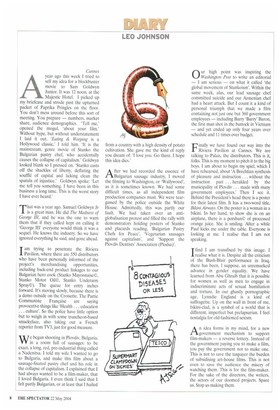Cannes A year ago this week I tried to sell my
idea for a blockbuster movie to Sam Goldwyn Junior. It was 12 noon, at the Majestic Hotel. I picked up my briefcase and strode past the upturned packet of Paprika Pringles on the floor. You don't mess around before this sort of meeting. You prepare — numbers, market share, audience demographics. 'Tell me,' opened the mogul, 'about your film.' Without hype, but without understatement I laid it out. 'Eating & Weeping is a Hollywood classic,' I told him. 'It is the mainstream, genre movie of Stanko the Bulgarian pastry chef, who accidentally causes the collapse of capitalism.' Goldwyn looked blank so I pressed on. `Stanko casts off the shackles of liberty, deflating the soufflé of capital and licking clean the spatula of injustice.' Goldwyn spoke: 'Let me tell you something. I have been in this business a long time. This is the worst story I have ever heard.'
That was a year ago. Samuel Goldwyn Jr is a great man. He did The Madness of George III, and he was the one to warn them that if they called kept on calling it 'George III' everyone would think it was a sequel. He knows the industry. So we have ignored everything he said, and gone ahead.
T am trying to penetrate the Riviera 1 Pavilion, where there are 550 distributors who have been personally informed of the
project's merchandising opportunities, including back-end product linkages to our Bulgarian hero cook (Stanko Mayonnaise), Stanko Motor OilO, Stanko Underarm Sprayt). The queue for entry inches forward. It's moving slowly, because there is a demo outside on the Croisette. The Partie Communiste Francaise are saying provocative things like 'Health . . education . . . culture'. So the police have little option but to weigh in with some truncheon-based smackyface, also taking out a French reporter from TV3, just for good measure.
We began shooting in Plovdiv, Bulgaria, in a room full of sausages: to be exact, a long, red, pre-industrial thing called a Nadenitsa. I told my wife I wanted to go to Bulgaria, and make this film about a sausage-fixated pastry chef and his role in the collapse of capitalism. I explained that I had always wanted to be a film-maker, that I loved Bulgaria. I even think I said that I felt partly Bulgarian, or at least that I hailed
from a country with a high density of potato cultivation. She gave me the kind of reply you dream of: 'I love you. Go there. I hope this idea dies.'
After we had recorded the essence of Bulgarian sausage industry, I moved the filming to Washington, or Wallywood', as it is sometimes known. We had some difficult times, as all independent film production companies must. We were teargassed by the police outside the White House. Admittedly, this was partly our fault. We had taken over an antiglobalisation protest and filled the rally with demonstrators holding posters of Stanko and placards reading, 'Bulgarian Pastry Chefs for Peace', 'Vegetarian sausages against capitalism', and 'Support the Plovdiv Dentists' Association (Plodsa)'. ur high point was inspiring the ‘...1 Washington Post to write an editorial
— I am serious — on what it called 'the global movement of Stankoism'. Within the same week, alas, our lead sausage chef committed suicide and our Armenian chef had a heart attack. But I count it a kind of personal triumph that we made a film containing not just one but 360 government employees — including Barry 'Barry' Baron, the first man shot in the buttock in Vietnam — and yet ended up only four years over schedule and 11 times over budget.
uinally we have found our way into the Riviera Pavilion at Cannes. We are talking to Palais, the distributors. This is it, folks. This is my moment to pitch it to the big boys. I am about to begin my spiel, which I have rehearsed, about 'A Brechtian synthesis of pleasure and instruction. . . without the instruction part . . . heralded by the municipality of Plovdiv . . . made with many government employees.' Then I see it. Behind the President's head there is a poster for their latest film. It has a two-word title, Bikini Airways. On the poster is a woman in a bikini. In her hand, to show she is on an airplane, there is a porshun© of processed orange juice. She is smiling. After a while Paul kicks me under the table. Everyone is looking at me. I realise that I am not speaking.
Ifind I am transfixed by this image. I realise what it is. Despite all the criticism of the Bush-Blair performance in Iraq, there has been, I suppose, an unremarked advance in gender equality. We have learned from Abu Ghraib that it is possible for women as well as men to engage in indiscriminate acts of sexual humiliation and torture. In our ghastly pornographic age, Lynndie England is a kind of suffragette. Up on the wall in front of me, bikini-clad, is a symbol of a world that is different, imperfect but prelapsarian. I feel nostalgia for old-fashioned sexism.
An idea forms in my mind, for a new government mechanism to support film-makers — a reverse lottery. Instead of the government paying you to make a film, you pay the government not to make one. This is not to save the taxpayer the burden of subsidising art-house films. This is not even to save the audience the misery of watching them. This is for the film-maker. For the sake of the directors, the writers, the actors of our doomed projects. Spare us. Stop us making them.


















































































 Previous page
Previous page